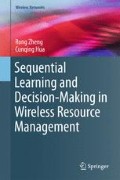Abstract
Sequential learning provides a rigorous framework to address the trade-offs between exploration and exploitation in face of uncertainty, vividly captured in the multi-armed bandit problem. In this chapter, we provide an overview of the sequential learning framework and a taxonomy of the types of problems where the framework applies.
Access this chapter
Tax calculation will be finalised at checkout
Purchases are for personal use only
References
V. Anantharam, P. Varaiya, and J. Walrand. “Asymptotically efficient allocation rules for the multiarmed bandit problem with multiple plays-Part I: I.I.D. rewards”. In: Automatic Control, IEEE Transactions on 32.11 (Nov. 1987), pp. 968–976. ISSN: 0018-9286.
Venkatachalam Anantharam, Pravin Varaiya, and JeanWalrand. “Asymptotically efficient allocation rules for the multiarmed bandit problem with multiple plays-Part II: Markovian rewards”. In: IEEE Transactions on Automatic Control 32.11 (1987), pp. 977–982.
Sébastien Bubeck and Nicol‘o Cesa-Bianchi. “Regret Analysis of Stochastic and Nonstochastic Multi-armed Bandit Problems”. In: Foundations and Trends in Machine Learning 5.1 (2012), pp. 1–122.
Sébastien Bubeck, Rémi Munos, and Gilles Stoltz. “Pure exploration in finitely-armed and continuous-armed bandits”. In: Theor. Comput. Sci. 412.19 (2011), pp. 1832–1852.
Shouyuan Chen et al. “Combinatorial Pure Exploration of Multi-Armed Bandits”. In: Annual Conference on Neural Information Processing Systems 2014. Montreal, Quebec, Canada, Dec. 2014, pp. 379–387.
Nicolo Cesa-Bianchi and Gabor Lugosi. Prediction, Learning, and Games. Cambridge University Press, 2006.
John Gittins, Kevin Glazebrook, and Richard Weber. Multi-armed bandit allocation indices. John Wiley & Sons, 2011.
Sylvain Gelly, YizaoWang, and Olivier Teytaud. Modification of UCT with patterns in Monte-Carlo Go. Tech. rep. INRIA, 2006.
Junpei Komiyama, Junya Honda, and Hiroshi Nakagawa. “Optimal Regret Analysis of Thompson Sampling in Stochastic Multi-armed Bandit Problem with Multiple Plays”. In: Proceedings of the 32nd International Conference on Machine Learning, ICML 2015, Lille, France, 6–11 July 2015. 2015, pp. 1152–1161.
Aditya Mahajan and Demosthenis Teneketzis. “Multi-armed bandit problems”. In: Foundations and Applications of Sensor Management. Springer, 2008, pp. 121–151.
Sandeep Pandey and Christopher Olston. “Handling advertisements of unknown quality in search advertising”. In: Advances in neural information processing systems. 2006, pp. 1065–1072.
Herbert Robbins. “Some Aspects of the Sequential Design of Experiments”. In: Bulletin of the American Mathematical Society 58 (1952), pp. 527–535.
William R Thompson. “On the likelihood that one unknown probability exceeds another in view of the evidence of two samples”. In: Biometrika 25.3/4 (1933), pp. 285–294.
Yisong Yue et al. “The k-armed dueling bandits problem”. In: Journal of Computer and System Sciences 78.5 (2012), pp. 1538–1556.
Author information
Authors and Affiliations
Corresponding author
Rights and permissions
Copyright information
© 2016 Springer International Publishing AG
About this chapter
Cite this chapter
Zheng, R., Hua, C. (2016). Introduction. In: Sequential Learning and Decision-Making in Wireless Resource Management. Wireless Networks. Springer, Cham. https://doi.org/10.1007/978-3-319-50502-2_1
Download citation
DOI: https://doi.org/10.1007/978-3-319-50502-2_1
Published:
Publisher Name: Springer, Cham
Print ISBN: 978-3-319-50501-5
Online ISBN: 978-3-319-50502-2
eBook Packages: Computer ScienceComputer Science (R0)

